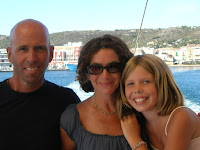
 “There is nothing either good or bad, but thinking makes it so”
“There is nothing either good or bad, but thinking makes it so”- William Shakespeare, “Hamlet”
We’ve had good times in Carloforte…
In just three months, we’ve been charmed by the village and adopted by its people. We’ve grown to appreciate the “village lifestyle”, where mail is sent to us via general delivery, where Jenna feels safe enough to venture out independently and where, the first time we tried to rent a DVD at the rental store, the only identification needed was our cell phone number written on a Post-it note
We’ve been fortunate to make such great friends--with Rafaella and her family, but also with people from Ireland, the UK, Poland, Milan and Rome—people generous enough to invite us into their homes, into their swimming pools, and onto their sailboats; people willing to jump over the language barrier to make new friends of strangers.
We’ve celebrated Jeff’s 50th birthday, and our 12th wedding anniversary here, and we’ve watched a shy, skinny cat become an affectionate, healthy mother to 3 lively kittens.
We’ve learned a lot about the proud Sardinians, about the sordid history of Isola di San Pietro, the slavery and the savagery and the Mafioso influences, about the quaint original Baraka structures, and the ancient Nuranghes scattered around the area (ancient stone structures build by Sardinian Fred Flintstones nearly 3000 years ago). We’ve developed local tastes for tuna pizza, cheap Sardinian white wine, and Mirto, a digestif made from tiny blackish-blue myrtle berries that grow freely in this area.
We’ve had the luxury and time to immerse ourselves in Mediterranean island life, to explore a unique town and a beautiful island, to relax and read and swim and cook.
We’ve begun to dream in Italian regularly…
And of course, like most real experiences in life, we’ve had our share of challenges.
Like the jellyfish stings and sunburns, visits to the dottore (doctor), the parking tickets, cheese codes, and the frustrations with our limited language skills.
Or there was that time when we accidentally burned that table and thought we’d paid a reasonable amount of money for the damage, but then were confronted in the piazza months later by the grandmother who convinced us that the damages were so severe that we needed to pay several HUNDRED more Euro.
Or that time we all got Swimmer’s Ear and thought it was just a bad ear infection, but then the pain got so intense that Jenna and I had to go to the hospital (which, by the way, cost only 36 Euro for two emergency visits).
Or that fateful day when Jeff jumped from the cliff into the ocean and lost his WEDDING ring. And how we snorkeled and searched for days and days and never found it.
Or that time we almost capsized the little boat we rented.
Or that time I was driving down that narrow street and clipped a parked van, managing to scrape the entire length of both vehicles. And the trouble we had filling out the accident report I found in the glove compartment, because the form was written in French (we have a French car, leased in France). And how I had to call France, and they had to find both an English and Italian interpreter.
Or that time Jeff was washing Terry’s sailboat and accidentally dropped an important piece of the boat into the water (the hatch cover) and it sank to the bottom, and how we couldn’t find it, and we had to rent a scuba diver to retrieve it.
But the challenges and “bad” times are all part of the package, an integral piece of the patchwork of experiences that make this time in Italy not an idyllic holiday resort vacation, but real life adventure. At least this is what Jeff keeps reminding me.
We are finally off to caretake a villa in Le Marche, a new region where we will undoubtedly stumble and blunder and manage to pull it off somehow.
NEXT UP: Le Marche
Like the jellyfish stings and sunburns, visits to the dottore (doctor), the parking tickets, cheese codes, and the frustrations with our limited language skills.
Or there was that time when we accidentally burned that table and thought we’d paid a reasonable amount of money for the damage, but then were confronted in the piazza months later by the grandmother who convinced us that the damages were so severe that we needed to pay several HUNDRED more Euro.
Or that time we all got Swimmer’s Ear and thought it was just a bad ear infection, but then the pain got so intense that Jenna and I had to go to the hospital (which, by the way, cost only 36 Euro for two emergency visits).
Or that fateful day when Jeff jumped from the cliff into the ocean and lost his WEDDING ring. And how we snorkeled and searched for days and days and never found it.
Or that time we almost capsized the little boat we rented.
Or that time I was driving down that narrow street and clipped a parked van, managing to scrape the entire length of both vehicles. And the trouble we had filling out the accident report I found in the glove compartment, because the form was written in French (we have a French car, leased in France). And how I had to call France, and they had to find both an English and Italian interpreter.
Or that time Jeff was washing Terry’s sailboat and accidentally dropped an important piece of the boat into the water (the hatch cover) and it sank to the bottom, and how we couldn’t find it, and we had to rent a scuba diver to retrieve it.
But the challenges and “bad” times are all part of the package, an integral piece of the patchwork of experiences that make this time in Italy not an idyllic holiday resort vacation, but real life adventure. At least this is what Jeff keeps reminding me.
We are finally off to caretake a villa in Le Marche, a new region where we will undoubtedly stumble and blunder and manage to pull it off somehow.
NEXT UP: Le Marche






